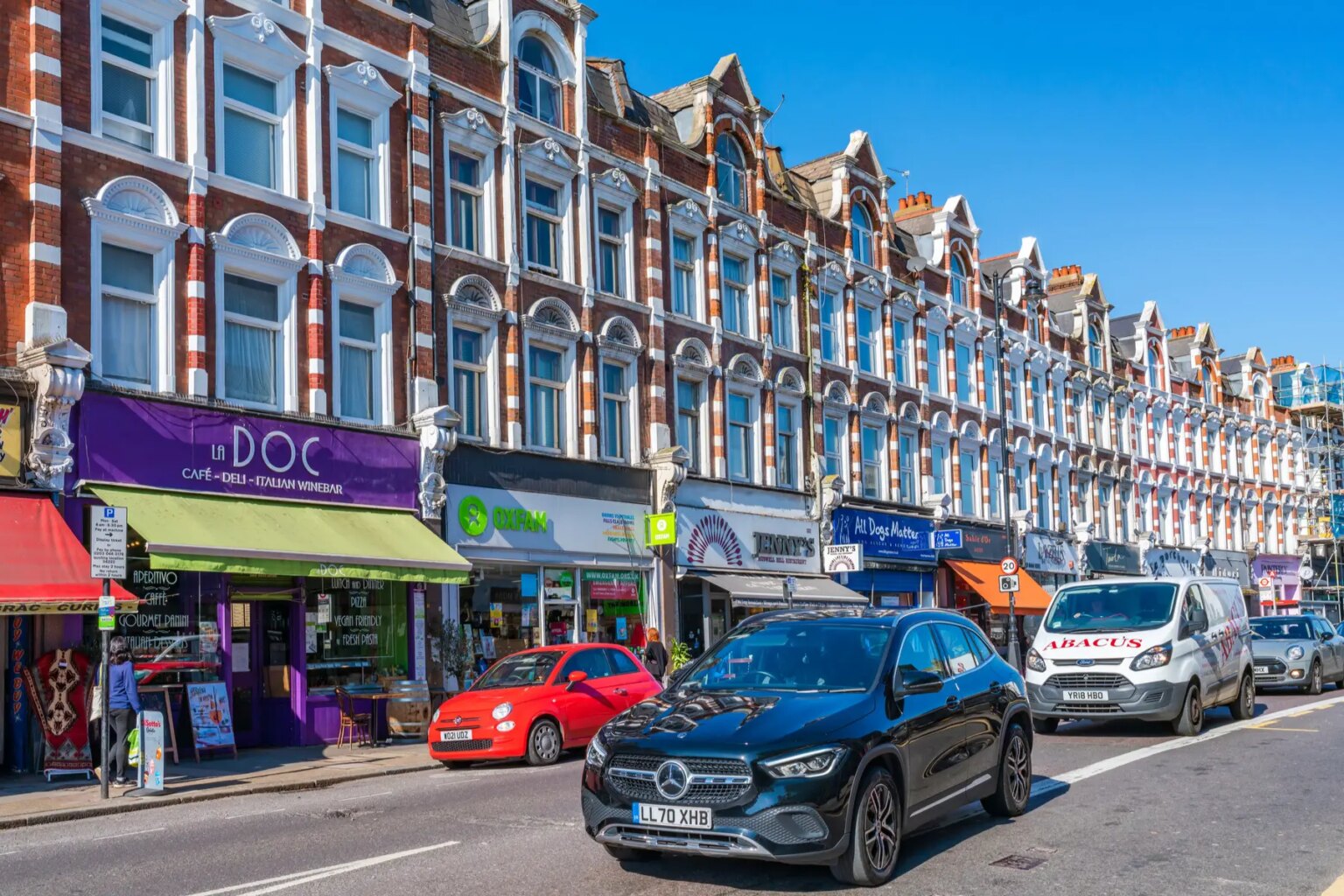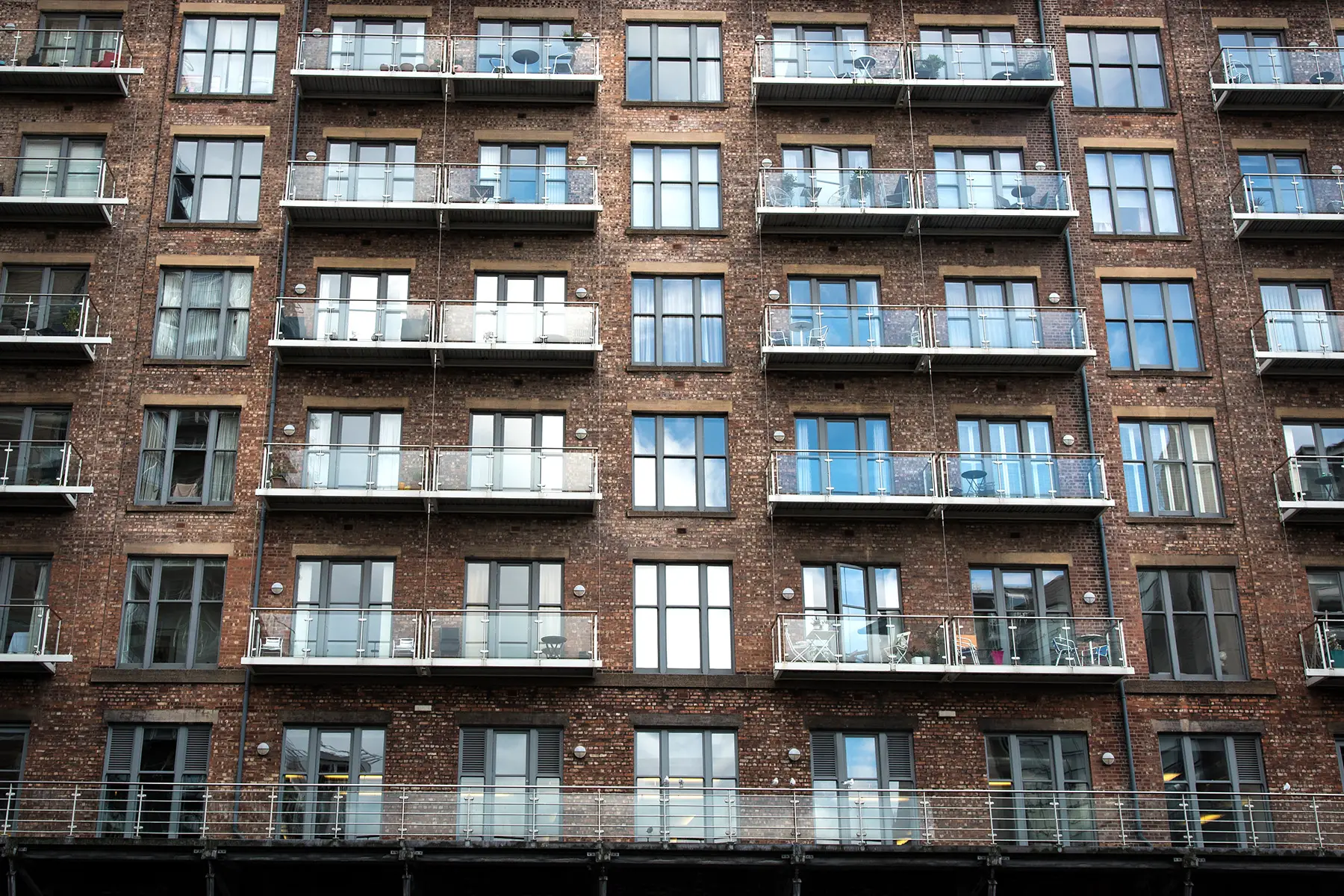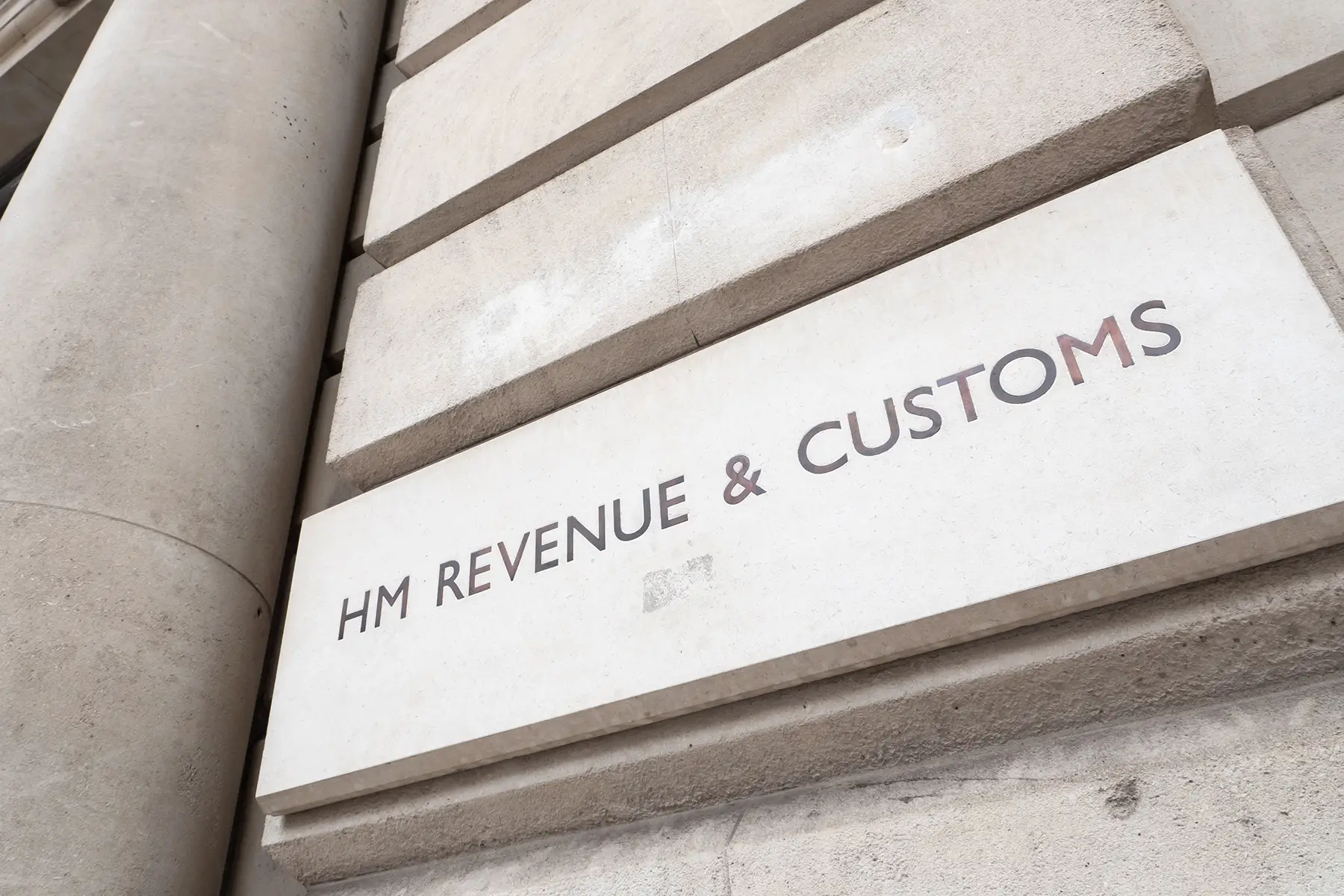With house prices increasing over the past few decades, renting has become popular across the UK. It is a more affordable and flexible option and a practical first step for many expats before buying a house. However, it can still be an expensive and complicated process, with various types of rental housing and separate tenancy laws in different parts of the UK.
If you’re moving to the UK and looking to rent, here’s all the key information to help you navigate the rental market:
- Renting in the UK
- Popular places to rent in the UK
- Buying vs renting in the UK
- Types of property to rent in the UK
- Finding a place to rent in the UK
- Student housing in the UK
- How to rent a property in the UK
- Rental costs in the UK
- Social housing in the UK
- Tenancy contracts in the UK
- Utilities and telecommunications in the UK
- Moving in and out of the UK
- Renting out your property in the UK
- Useful resources
Renting in the UK
The Department for Levelling Up, Housing, and Communities is the central UK government body responsible for housing. However, since much of the housing policy in the UK is devolved to the regional governments, there can be variations in rental laws, procedures, and social housing availability. This article gives an overview of renting in the UK but focuses more on England. For specific information relevant to other parts of the UK, you can check these links for Scotland, Wales, and Northern Ireland.
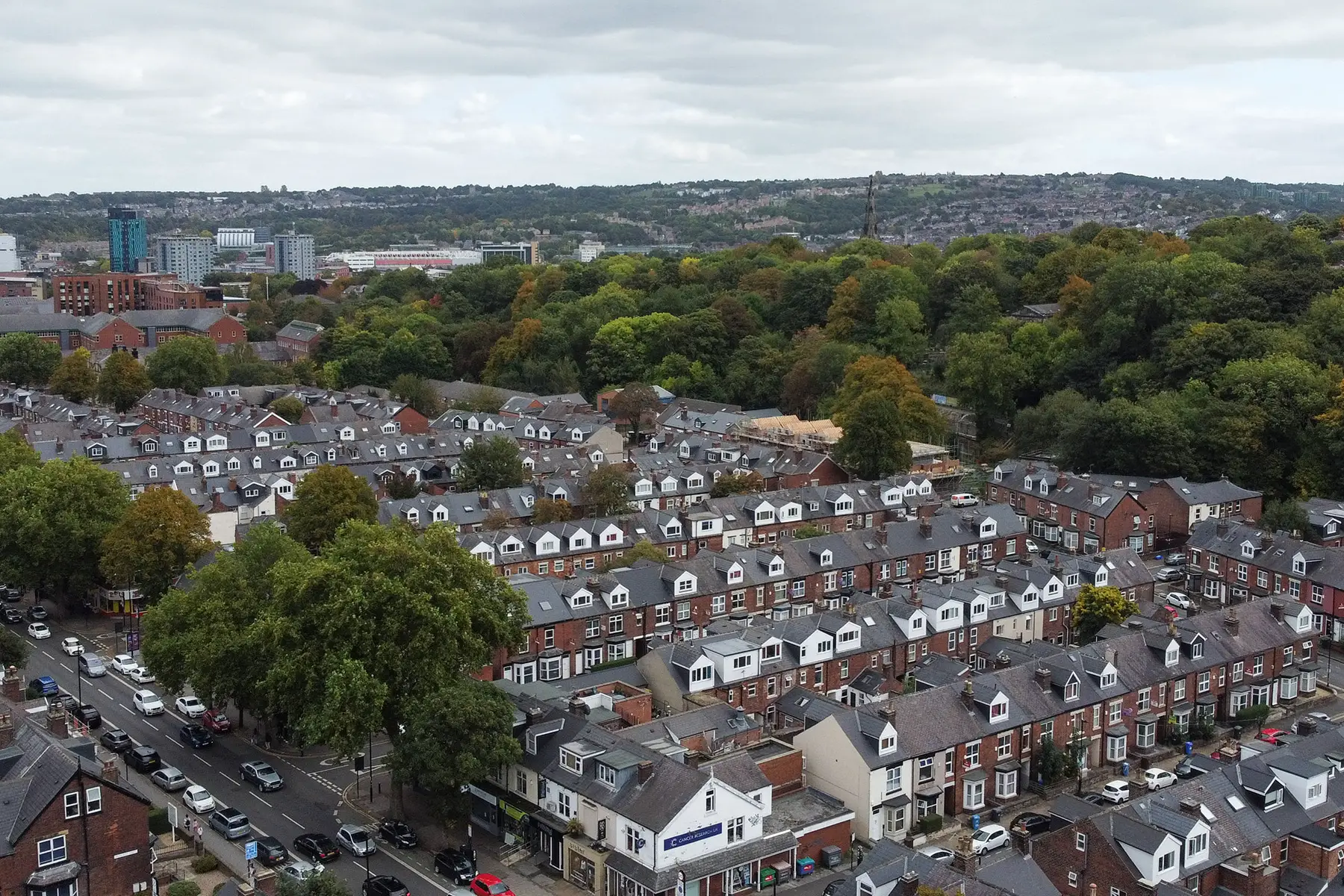
Just under 35% of UK residents rent their homes, which is above the EU average. Although there is social housing across the UK, it is limited in stock. Around one in five people rent from private landlords and foreign-born residents are more likely to rent. Because of this, it’s important for expats moving to the UK to fully understand rights, regulations, and options when it comes to rental accommodation.
Popular places to rent in the UK
You can find rental accommodation almost anywhere in the UK, from busy cities to small rural villages. If you want to research what to expect in different parts of the UK, you can use Find A Hood to gain insight into neighborhood characteristics.
London
London is the UK’s capital and most populous city, with nearly nine million residents. This is over one-eighth of the overall UK population. Around 37% of its residents are foreign-born, the highest in the UK. More people rent in London than elsewhere in the country, with 29% in private rented accommodation.
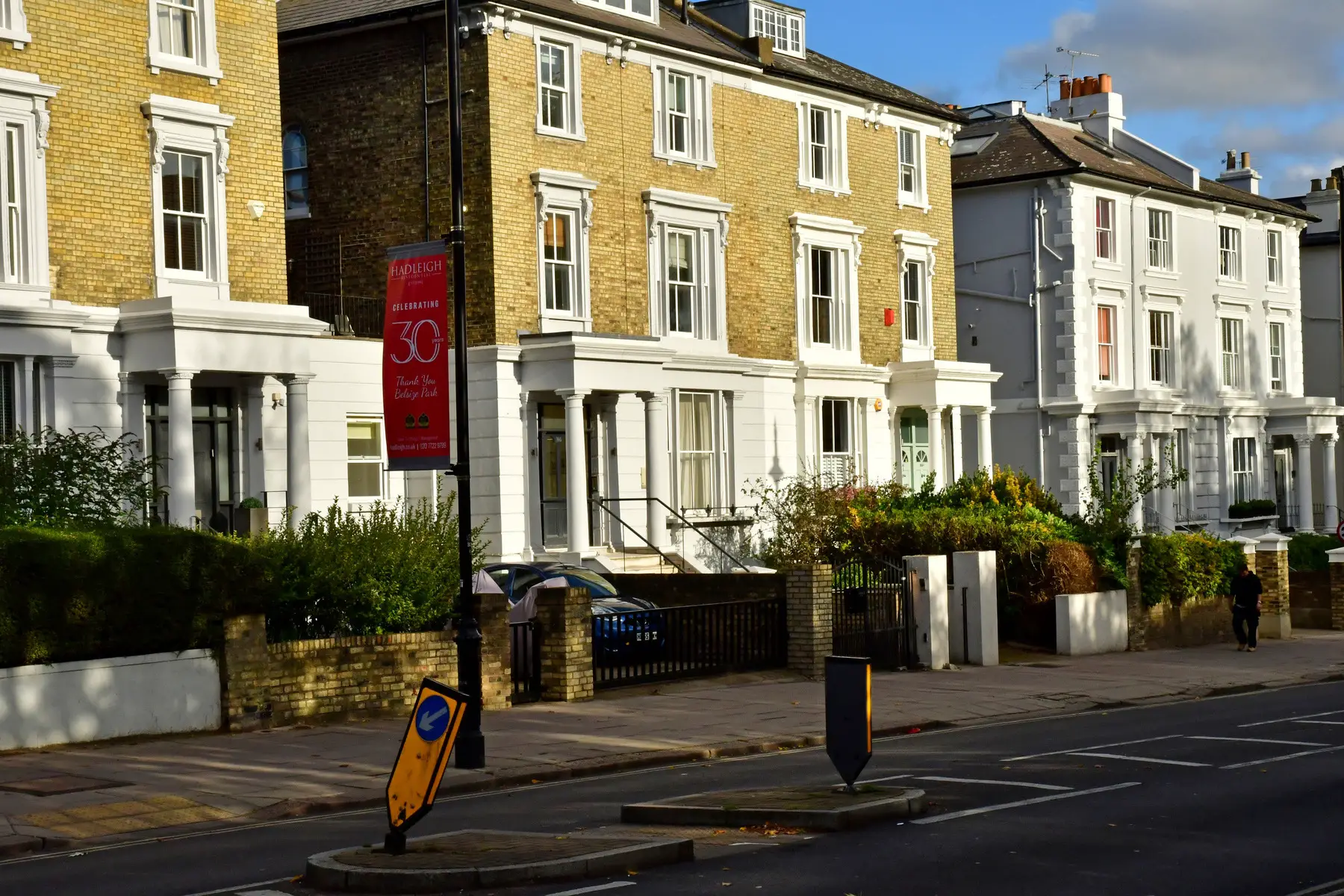
It’s no surprise that internationals are drawn to London. It’s one of the most well-known global cities, frequently voted among the best for job opportunities, business, universities, and culture. It is also one of the most multicultural cities globally and has many thriving neighborhoods.
However, it’s also the most expensive city in the UK. Average rents are £1,425 a month, nearly twice the national average, and it reports a higher crime rate. Therefore, you’ll need to do your research before choosing a place to rent.
You can search for rental properties in London using online search tools, such as Zoopla, OpenRent, and Rightmove. There are also agencies specific to London; Dexters and Foxtons. Check out the London rent map produced by the Mayor’s Office for information on rent prices. The most common rental accommodation types are apartments, studio flats, and terraced homes. There are larger detached and semi-detached properties in the outer suburban areas.
Manchester
Manchester, the biggest city in northern England, is famed for its musical and sporting heritage. It is the economic hub of the north, home to the UK headquarters of companies including Kellogg’s, Adidas, and the Co-op Group. Around 25% of the city’s population is foreign-born.
Rental accommodation is more affordable than in London, although the average monthly cost of £836 is still slightly above the national average. Apartments dominate the city center and vibrant areas like Deansgate. Further out, in neighborhoods such as Didsbury, you find family homes, terraced houses, and large Victorian properties. You can contact several local letting agents in the city to look for a place.
Edinburgh
Located on the Firth of Forth, Edinburgh boasts seven ancient hills, including one upon which its castle was built. Unsurprisingly, it has a reputation as one of the UK’s most beautiful cities. It’s the capital of Scotland and an arts festival hub (e.g., Fringe and International Festival). However, the frequent cold and wet weather can be a downside.

Around 22% of people rent privately in the city, according to the 2011 Census. Non-British nationals make up 16% of the population.
The city offers many rental opportunities in the center, including the historic neighborhood of Stockbridge, to further afield in Morningside and Portobello. The Edinburgh rental housing stock consists of various property types, including large tenement apartments in 19th-century Victorian buildings. You can search online or contact local letting agencies to find properties. Rents average £946 a month, making the city one of the most expensive in Scotland but not too far above the UK average.
Cardiff
The Welsh capital city, Cardiff, was historically a coal mining hub. Today, it is the economic and cultural center of Wales. It’s a fast-growing area attracting migrants due to its accessibility, job market, and affordability for a city of its size and stature. However, rents are rising faster than elsewhere in Wales, and the average is currently £828 per month. Around 13% of Cardiff’s residents are non-UK born, the highest percentage in Wales.

Nearly half of all rentals in the city are apartments and studio flats. However, you can find bigger detached and semi-detached properties in the suburbs. Local estate agents can help you find a rental home.
Buying vs renting in the UK
There are pros and cons to renting and buying a home in the UK. Renting makes more sense if you want flexibility and not the responsibility of owning a place. You also won’t need thousands of pounds in the bank for a deposit or have to pay additional costs such as stamp duty. Renting in the UK also gives you time to gain insight into the property market and establish where you would like to buy.
However, buying a home means having a place to call your own with the freedom to renovate. It’s also an investment, and monthly mortgage payments are often cheaper than rent. But, there’s no denying it’s a considerable risk. If property prices plummet, you can lose thousands of pounds. Buying in the UK is best when property prices are low or if you plan to settle long-term.
Types of property to rent in the UK
You can find numerous types of property on the rental market in the UK. Here are the main ones:
- Apartment – also known as a flat, this is one of the most common types of rental property, especially in bigger cities. Flats can be purpose-built in high-rise blocks, or conversions within individual houses or commercial spaces. They range from studio apartments to four-bedroom dwellings, and usually have communal features, such as shared entrance and refuse collection.
- Terraced houses – or townhouses are rows of identical homes attached to each other. Many were built in the 19th century. Terraced homes are common rental properties in many areas and they tend to be cheaper than other houses. Most have one to three bedrooms.
- Detached houses – single buildings that are typically bigger and more expensive than many other property types. Typically, they have a garden and between one to five bedrooms.
- Semi-detached houses – similar to detached houses but made up of two homes within one building. Cheaper and smaller than detached homes but usually more expensive than townhouses or apartments. Most have one to three bedrooms.
- Bungalow – similar to a house but a single-story building. Popular with older residents or those with disabilities who want to avoid stairs.
- Maisonette – a home in a multi-story building that is similar to an apartment but with its own outside entrance and usually consisting of two floors.
- Cottage – a small house typically unique in design and with attractive features such as a thatched roof. Mostly found in rural areas and usually expensive.
- Mansion – luxury home with multiple bedrooms and usually additional features such as a swimming pool.
- Bedsit – a one-room apartment with shared kitchen and bathroom facilities. These are often within houses of multiple occupations (HMO).
Other features of UK properties
You can rent properties in the UK, both furnished and unfurnished. Most properties are furnished, which means they should include beds, sofas, tables, chairs, and wardrobes. Some may also include extras such as TVs, microwave ovens, or bed linen. You can also find places advertised as semi-furnished, meaning that they will have some but not all of the standard movable furniture. All properties should detail what they include to know what you may need to buy.
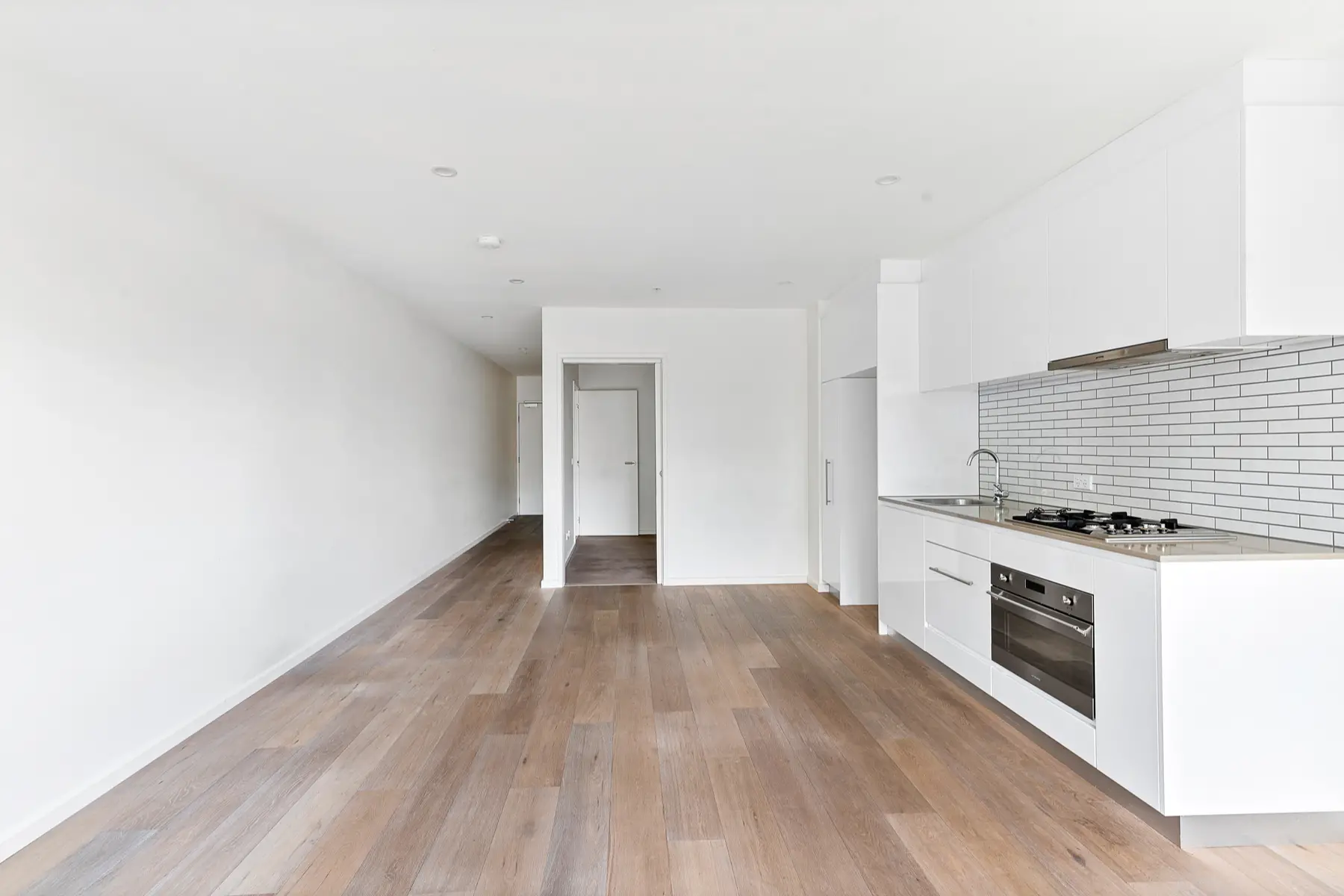
Unfurnished properties in the UK still typically include fixed furnishings, for example, carpets plus kitchen and bathroom fittings. You will need to provide movable furniture. A property advertisement should state clearly if it does not include these amenities and be priced accordingly.
You can also find serviced apartments in the UK that are furnished properties with extra amenities, for example, cleaning or laundry services and wifi. These are typically more expensive but often used by short-term visitors to the UK.
Finding a place to rent in the UK
Online portals
Online property portals have grown in popularity over the last few years as more people engage with digital services and apps. There are now many websites in the UK where you can see what’s available, filter your searches to suit your criteria, and sign up for alerts.
Top UK sites include:
Letting agents
You can look for rentals through a letting agent in the UK. This makes things easier as the agent will assist you in finding suitable properties and deal with the initial admin. Many landlords use agents to find tenants and manage the property. As a result, you may deal with an agency instead of the owner.
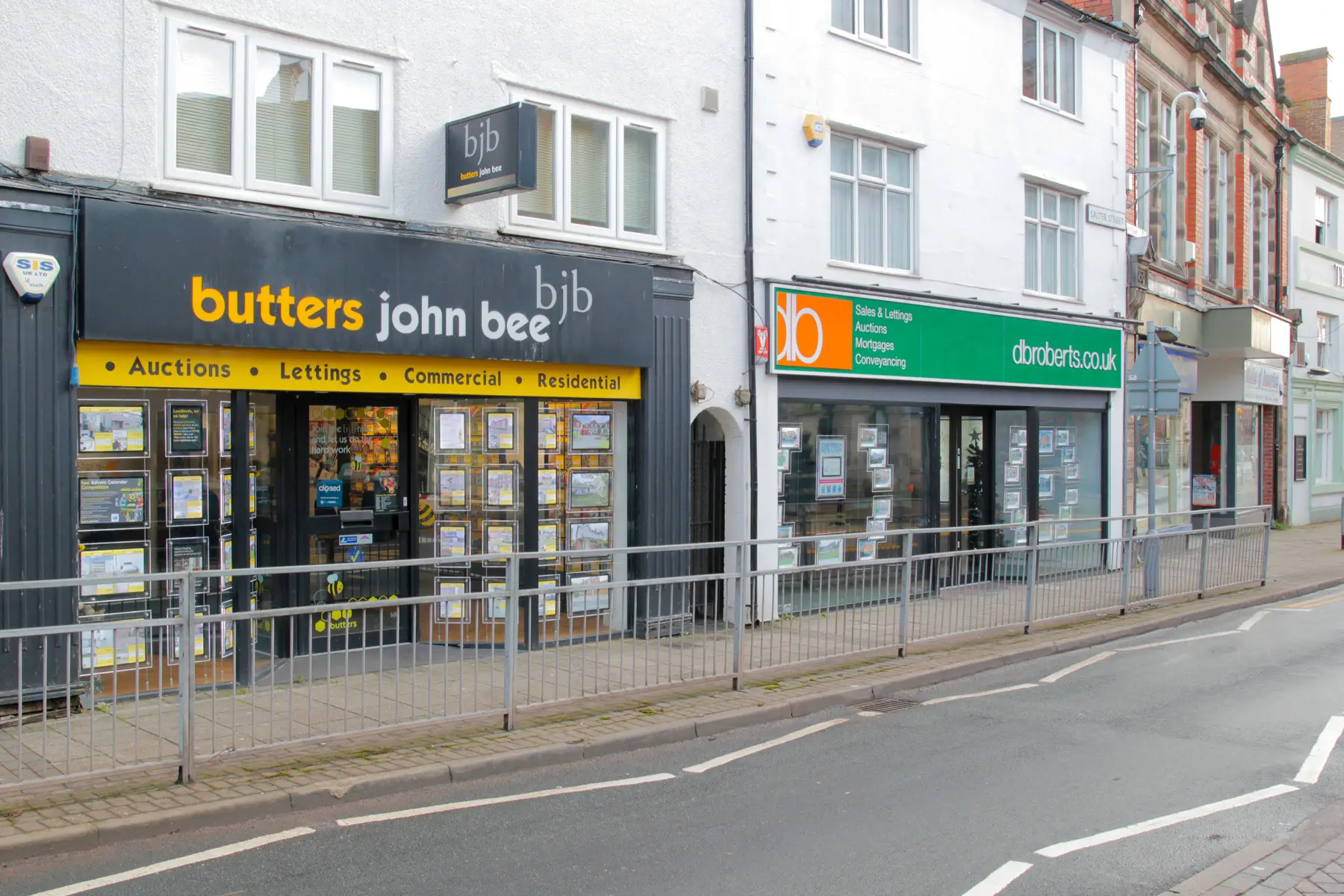
Since June 2019, letting agents (except in Northern Ireland) cannot charge renters when:
- Setting up the tenancy
- Checking references and credit history
- Renewing or ending the rental agreement
You can find both national and local agents in most cities. Make sure they are members of one of the primary industry bodies, which include:
All agencies in England should also be members of an independent redress scheme. The primary goal of a property redress scheme is to resolve or settle unresolved complaints from consumers when a member’s action caused them to suffer a loss.
Furnished rentals
A furnished rental is a good solution for professionals or tourists who do not want to stay in a hotel and only need a short-term lease with minimum responsibility.
Local papers
Some private landlords still use traditional classified ads in local papers. Sometimes, you find an absolute gem in these, not featured anywhere else.
Community boards
Do not forget about notice boards at community centers, churches, schools, supermarkets, and newsagents. Do not rely on this as your only property search method, but it doesn’t hurt to keep an eye out for local offers.
Flatshares
Flatsharing is common in the UK, especially in expensive cities such as London, where many people save money by renting out a room in shared accommodation rather than striking out alone. Flatsharing saves money, and can also be a great way of making new friends if you’re new to a country. You’ll typically find multicultural households consisting of younger people in flatshares.

However, consider that flatsharing tends to be more informal than renting a place on your own. You may not be a named tenant on the rental agreement; therefore, you’ll have no guaranteed protection. If this is the case, it’s good to draft a simple contract (one page should suffice) or ask for something in writing. Ensure you get details of the deposit protection scheme if you are asked to pay a deposit upfront.
Flatsharing websites in the UK include:
Specialist lettings
The Ethical Lettings Agency specializes in low-cost lets if you are looking for budget options. It offers assurances regarding the standards of properties and landlords. They also provide benefits advice.

Some agents specialize in homes for people with disabilities. PLG is a leading disability property specialist that can help find rentals tailored around individual needs. Branch Properties also helps people with disabilities to find accessible accommodation.
Student housing in the UK
As a student, you have the same rights as any other private tenant. Your university housing office can help with finding suitable student rentals. You can also do an online search for accommodation through dedicated student portals, which include:
Students can choose from a variety of accommodation options in the UK, for instance:
- Private rented homes or rooms – a common option for UK students, especially from the second year onwards. Rooms can be rented from private landlords, letting agents, or student accommodation specialists.
- University campus halls – owned and managed by universities and usually consisting of a single room with a small en-suite bathroom, plus a shared kitchen or communal room, laundry facilities, and front house security. Often only available for the first study year.
- University-managed homes or rooms – similar to private accommodation but managed by universities. Often limited in availability.
- Private halls – similar to university campus halls but overseen by private companies and more expensive.
- Homestay – a room in a family home, which is popular for short study visits. You can search websites, such as Academic Families, British Homestays, or Homestay, to find accommodation.
How to rent a property in the UK
Renting through a property agency
Many UK rentals are through property or letting agencies that deal with admin, rent collection, and any issues or repairs on behalf of the landlord. If you find accommodation through an agency, they will usually manage the property too, unless the landlord has only contracted them to find a tenant. Agencies also manage many rentals advertised through online portals.
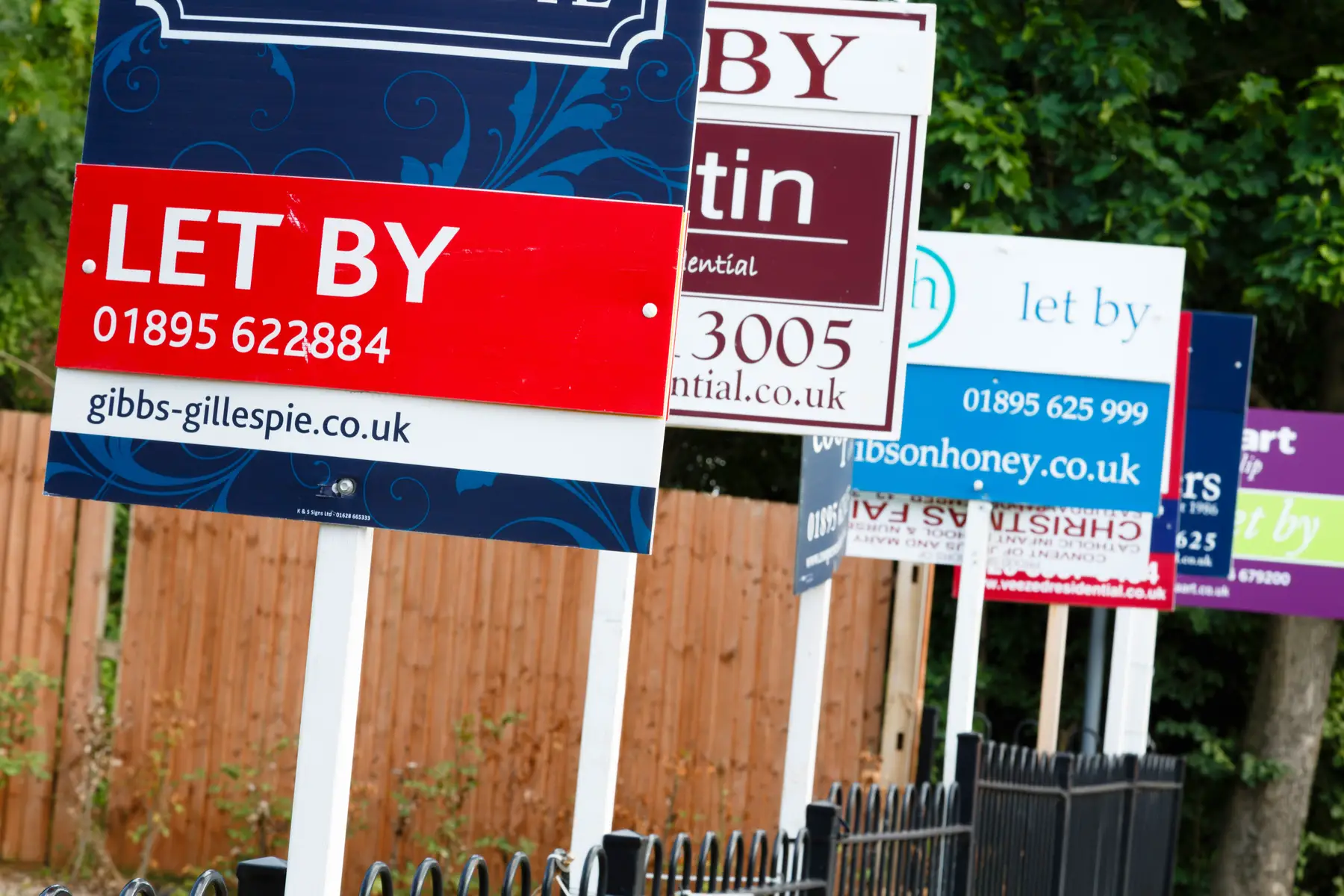
If you go through an agency, rent is typically higher as the agents charge fees to the landlord. However, it is now illegal for an agent to charge fees for viewings, setting up or renewing the tenancy, or tenant checkouts (apart from Northern Ireland).
Agents will deal with property viewings. They should provide you with key information about the property (e.g., rental costs, minimum tenancy period) upfront and answer any questions. You may need to pay a holding deposit to reserve a property. Typically, it is around a week’s rent and will be refunded if you do not get it.
Once the landlord accepts your application, you will need to pay the tenancy deposit with the first rent installment. Usually, it amounts to four or five weeks of rent. You will also need to provide:
- Identification such as a passport
- Proof of immigration status
- Financial status (details of employment or bank statements)
- Credit history, usually done through an independent credit check
- References from your current landlord (if available)
Most agents require tenants to have a monthly salary of around two and a half times the monthly rent. If you cannot prove this or don’t have landlord references, the agency may ask you to provide a rent guarantor.
If you need assistance with building your credit score, it’s worth checking out apps such as Credit Engine, which provide tools and guidance.
Renting directly through a private landlord
You can rent directly from landlords in the UK. This is usually cheaper as the landlord won’t have to add on agency fees when calculating rental costs. Landlords should belong to an accreditation scheme and follow similar rent, fees, and property maintenance regulations. If you rent directly from a landlord, ensure that the rental agreement protects your tenant’s rights.
Rental costs in the UK
Monthly rent
According to the latest government statistics for England (December 2021), the median monthly rent across the country is £755. This ranges from £500 in the North East to £1,425 in London. Averages for different property types nationwide are:
- Room in a house or flatshare – £420
- Studio apartment – £595
- One-bedroom property – £675
- Three-bedroom property – £850
- Four or more bedrooms – £1400
These costs exclude bills. However, some rental fees include council tax, water, or electricity bills. Your tenancy contract should give full details of what is included in your monthly rent.

Rent is typically paid by direct debit or standing order, especially if you go through an agency. Some landlords may accept different methods, including cash payments. Make sure you get a receipt for this.
Laws regarding rental controls differ across the UK. Only Scotland has regulations controlling rent increases, and ministers have the power to introduce local rent caps where prices are increasing too quickly. Elsewhere in the UK, there is no rent control, and landlords can increase costs as they wish once fixed-term tenancies end. Naturally, you may be able to challenge a rent increase if you think it’s unreasonable.
If you don’t pay your rent, you risk eviction. However, there are regional differences concerning notice periods and processes. In England, since August 2021, your landlord must give you two months’ notice unless you owe at least four months’ rent. If you refuse to leave, your landlord has the right to apply for a court order which may result in eviction by bailiffs.
Rental deposit
You will need to pay a deposit when renting a home in the UK. This protects the landlord against damages or unpaid rent. Since 2019, deposits in England can be no more than five weeks’ rent (or six weeks if the annual rent is over £50,000).
Your landlord must return the deposit, minus any rent owed or damage costs, at the end of the tenancy. They pay deposits into a government-approved deposit protection scheme. You can take your landlord to court if they don’t protect your deposit in a scheme. You can also contest any deductions through a dispute resolution process.
Agency and administration fees
Agencies can no longer charge fees for administrating or handling contracts, viewings, property searches, or credit checks. The only tenant charges include:
- If the tenant requests an early termination of occupancy
- Up to £50 (or more, if there is proof of higher costs) to make changes to the tenancy or transfer to someone else
- Penalties for late rent payment or key fob replacements
If a letting agent or landlord tries to charge you any other fees not connected with rent, deposit, or utility bills, you can complain to the letting agent redress scheme or Trading Standards through Citizens Advice.
Insurance
If you’re moving into rented accommodation with your belongings, you might want to take out a contents insurance policy. Contents insurance in the UK is not compulsory. However, it is worth considering if you rent an unfurnished property and buy furniture or more expensive items such as a television. Your landlord is only responsible for the building insurance.
UK contents policies cost an average of £57 a year, with premiums based on your belongings’ value and risk factors. You can check costs and compare deals on Confused or MoneySuperMarket. Many home insurance companies in the UK, such as AA, Aviva, and Axa also offer contents insurance packages.
Other costs
Other costs that you may have to budget for when renting in the UK are:
- Council tax – annual municipal tax paid in 10 installments, the amount depending on your property value. You can check your tax amount on the GOV.UK website.
- Utility bills – these include electricity, gas, and water if they are not included in your monthly rent.
- Other bills – including TV, phone and internet. If you have a TV, you also need to pay the annual license fee.
Help with costs
If you’re unemployed, unable to work, or a low earner in the UK, you can apply for Universal Credit. This is a monthly allowance that includes a housing benefit to cover rent. The amount is currently £324.84 a month (£257.33 if you’re under 25), which is increased if you have dependent children, a disability, or a health condition.

In addition to this, you can apply for a council tax reduction. Depending on the severity of your financial situation, you may also be eligible for additional support, such as hardship payments or loans.
You can contact Shelter, the national housing charity, for advice on what to do if you default on your rent payments. Note that this MoneySavingExpert article also provides handy money-saving tips for UK tenants.
Social housing in the UK
Social housing or council housing has existed in the UK for over 100 years. It protects tenants by offering lower rents and more secure occupancy. Housing associations, charities, and local councils provide different types of council housing in the UK, including:
- Apartments in tenement blocks
- Terraced houses
- Semi-detached houses
- Bungalows
- Supported housing units
Around 16.6% of households in England and 24% in Scotland live in social housing (2021). However, there is a shortage, with over a million prospective tenants on the waiting list in England. Housing allocation is based on a points system according to need. Priority groups include:
- People who are homeless
- Residents currently living in poor or overcrowded conditions
- Tenants with disabilities or severe medical conditions
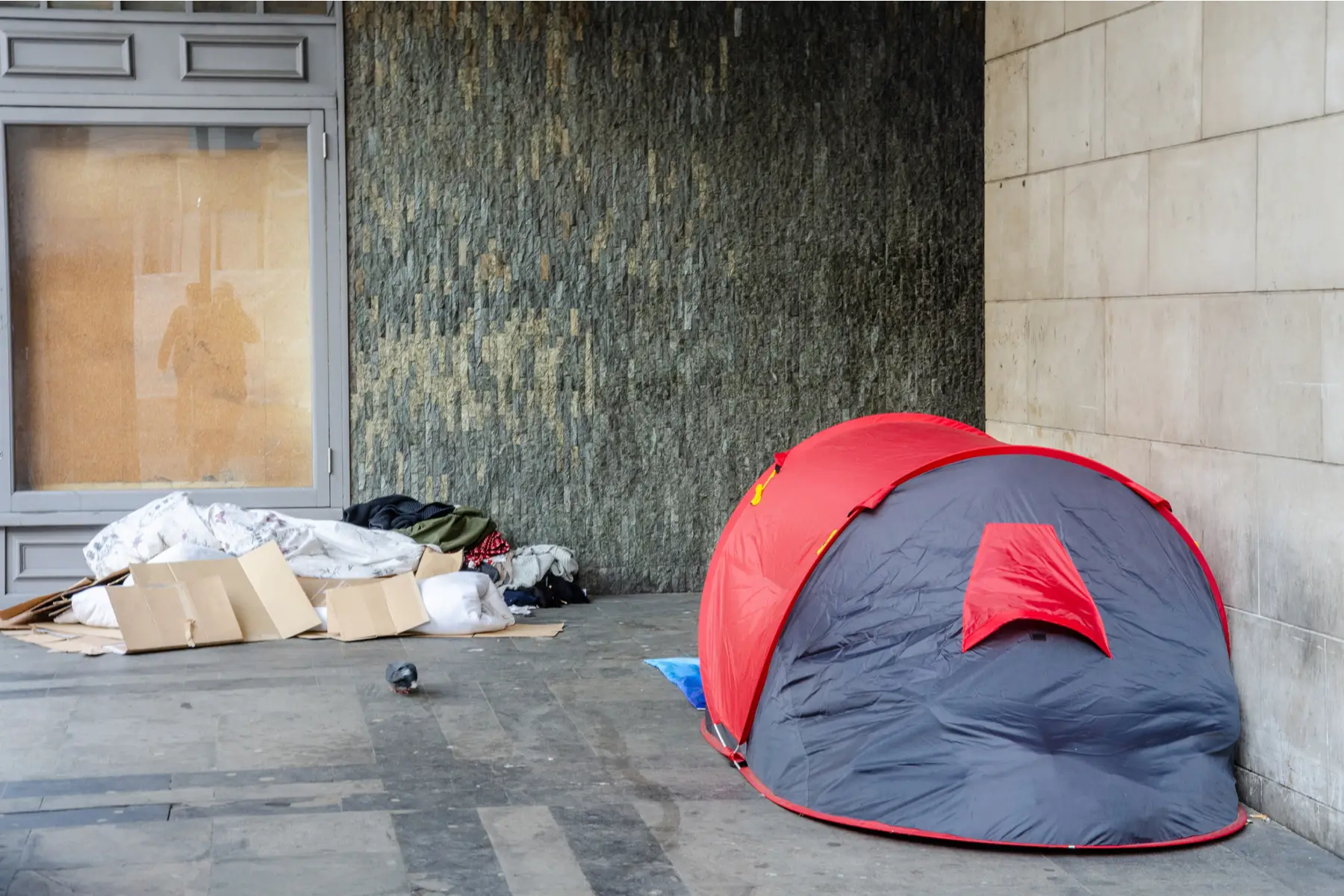
Expats in the UK can lodge an application for social housing if they have British citizenship, settled status, or indefinite leave to remain. They can also apply if they can prove a connection to the UK, such as a family member with citizenship. You will need to register at your local municipality, providing an ID and a reference. Those at the top of the waiting list can bid on available properties.
Unlike private rents, there are caps on social rents and increases. According to the government’s English Housing Survey for 2020–2021, the average weekly social rent in England is £103 (just under £450 a month), which is about 60% of the average private rent.
Tenancy contracts in the UK
In England and Wales, the majority of tenancy contracts or agreements are assured shorthold tenancies (AST), while Scotland has private residential tenancy (PRT) agreements. In Northern Ireland, these are simply tenancy agreements.
Tenancy contracts are typically fixed-term for six or twelve months, although they can be open-ended or rolling. Sometimes you may have a verbal rather than written agreement. However, it is not recommended.
The landlord and tenant(s) should sign contracts that include:
- Names and contact details of both parties
- Tenancy start date
- Amounts owed on rent and any bills payable to the landlord
- Length of any fixed-term agreement
- The notice period for both parties (typically, a tenant needs to give one to three months, while the landlord must give at least two months)
- Rent review clause, if your landlord wants to increase the rent at any point
- Details of the landlord and tenants’ responsibilities
Some fixed-term agreements include a break clause that allows tenants to leave early. If you terminate a contract early without a break clause, you may still be liable for rent for the remainder of the fixed term. You can view a sample tenancy agreement here.
Tenant responsibilities
The key tenant responsibilities in the UK are:
- Paying rent and bills on time
- Looking after the property and returning it in the same state at the end of the tenancy
- Notifying the landlord of any problems that emerge with the property
- Asking for permission before making any renovations
- Not subletting any part of the property without permission from the landlord
- Following rules laid down in the contract, such as regulations regarding pets, smoking, or having guests
- Regularly testing smoke alarms (monthly testing recommended)
Landlord responsibilities
The key landlord responsibilities are:
- Providing the tenant with necessary up-to-date paperwork on rental deposit, gas safety, and energy performance (plus the How to rent guide in England)
- Ensuring that the property is safe, habitable, and free from hazards
- Fitting the property with working smoke and carbon monoxide alarms
- Dealing with any problems raised by the tenant and doing necessary repairs
- Ensuring that a certified technician carries out an annual gas safety check
- Giving tenants at least 24-hour notice before visiting
- Getting a license if the property is a house in multiple occupation (HMO) like a flatshare

Landlords can terminate the tenancy at the end of the contract or give at least two months’ notice once the fixed-term period is over. If the tenant refuses to leave, the property owner has to apply for a possession order from the court to obtain an eviction. Landlords can apply for early eviction (e.g., Section 8 or 21) only under certain circumstances, such as rent arrears, wilful damage to the property, or causing a nuisance to the neighbors.
Where to go in the event of a dispute
If you have a problem with your landlord in the UK, you should first try to resolve it with them directly. This can be verbally or in writing. If this doesn’t work, you can contact your local council, which has the power to intervene on matters including evictions, harassment, repairs, and unfair trading behavior. As a last resort, you might be able to take your landlord to court.
You can seek advice on housing matters and landlord disputes from charities such as:
Utilities and telecommunications in the UK
Most rentals in the UK require you to set up utilities and telecommunications contracts in your name. This includes electricity, gas, water, phone, and internet. You will also need to buy an annual TV license if you own a TV set.
Many energy companies offer combined deals for electricity and gas, while telecommunication providers offer packages including landlines, internet, and TV. With some, you can also include a mobile phone contract. You will need to set up an account with your regional provider for water.
It’s possible to transfer agreements from your current address. You can use companies such as Uswitch if you want to change providers or search for the best deals.
Moving in and out of the UK
You should be able to move in as soon as you sign the contract and pay the deposit. The landlord or lettings agency will provide you with an inventory detailing the contents of the accommodation and the condition of everything. You should also get meter readings for utilities.
Before moving out, you must provide written notice if you are ending the tenancy contract. The landlord or agent will probably be at the residence on the moving-out day to retrieve the keys and check the property’s condition against the inventory. It’s a good idea to be present during this process. Landlords can no longer add a clause stating that properties must be professionally cleaned. However, ensure everything is in a fit state to avoid deductions from your rental deposit.
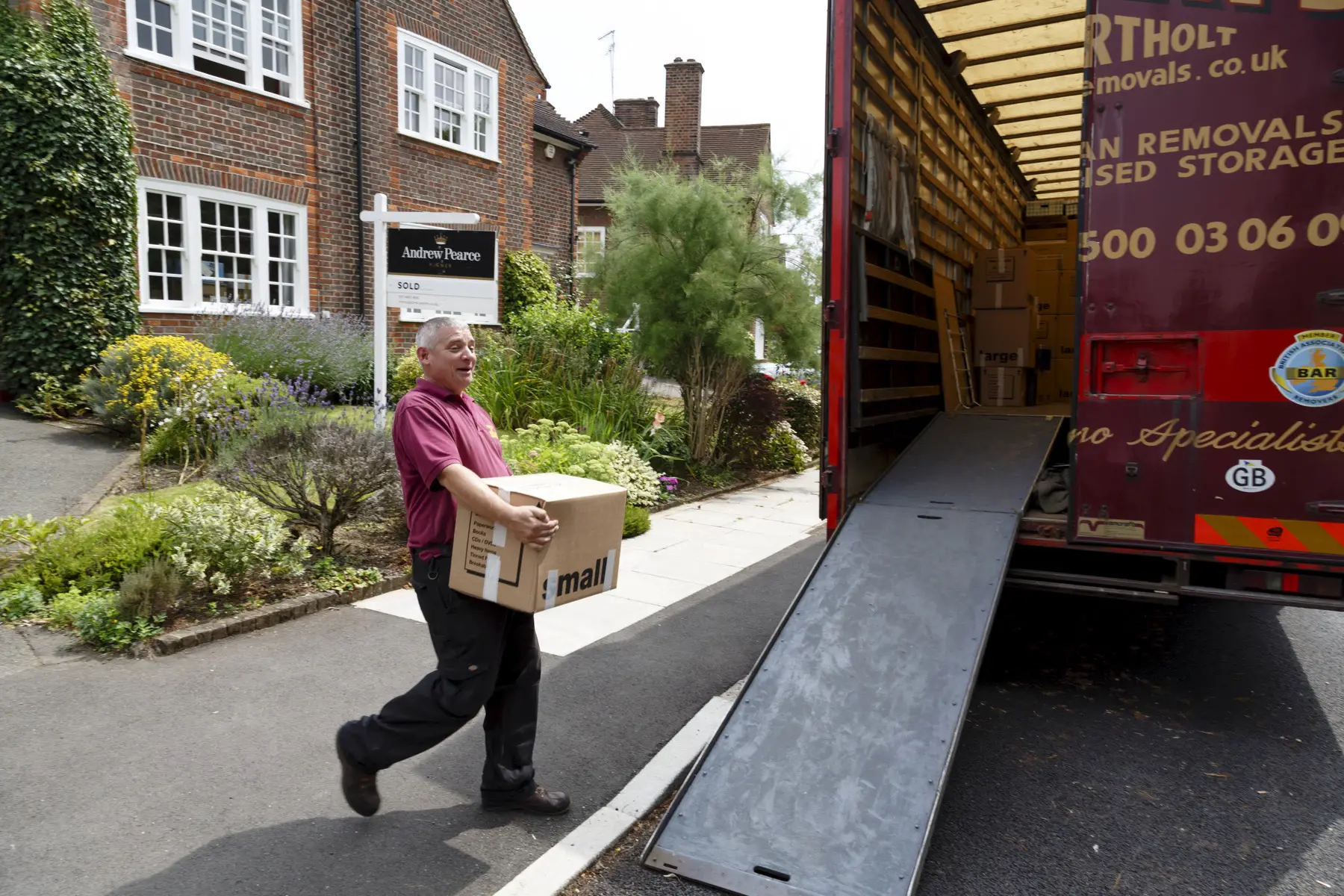
You also need to supply final meter readings to your utility providers so that they can issue an accurate bill.
Should you need help with the move, you could enlist the help of a moving company. It’s also worth browsing online platforms such as TaskRabbit to find helpers for the move and cleaning.
Landlords should notify you within ten days of any planned deductions and will usually reimburse deposits within one month. If any discrepancies or disagreements arise, you can resolve these through a dispute resolution process.
Renting out your property in the UK
You can rent out a property in the UK if you own it or if you have a sublet clause in your tenancy contract. Of course, there are many things to consider and you will have certain responsibilities as a landlord, including:
- Making sure the property is safe and fit to live in
- Ensuring that all gas and electrical equipment is routinely checked
- Providing an Energy Performance Certificate
- Placing any deposit paid by the tenant into a Tenancy Deposit Scheme
- Providing the tenant with the How To Rent guide and checklist
- Carrying out repairs as necessary
You can rent your property through the online portals and letting agents listed above. You can also advertise privately or on social media. If you use an agent, you will have to pay fees, which will be one-off if they only find suitable tenants. However, if they also collect the monthly rent and manage the property, their charges will be equivalent to 10% to 20% of the monthly rent.
Additionally, you may have to pay tax if you earn more than £1,000 a year from rent. You’ll have to declare it on a self-assessment tax return if you earn over £2,500. You will also pay Class 2 National Insurance if you rent out properties as a business or primary income with a profit of over £6,515 a year.
If you have a problem or dispute with tenants, you should follow these steps:
- Firstly try to resolve the issue directly with the tenant(s)
- If this doesn’t work, you can try using a mediation service
- If all else fails, you can take the tenant(s) to court
You can also make an online possession claim if you want to get the property back due to unpaid rent. Bear in mind that you have to follow specific procedures to evict tenants.
Useful resources
- GOV.UK – government checklist for renting in England
- GOV.SCOT – government information on renting in Scotland
- Rent Smart Wales – government information on tenants’ rights in Wales
- NI Direct – information for tenants in Northern Ireland
- GOV.UK – information on UK social or council housing
- Citizens Advice – free housing advice and support for UK residents
- Shelter – UK housing charity providing tenant support and advice
